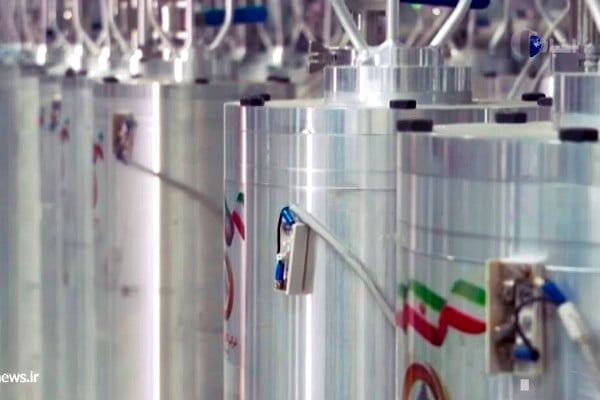This development was ‘very worrisome,’ International Atomic Energy Agency (IAEA) head Rafael Grossi was quoted as saying.
By Natan Galula, JNS
Iran has in recent weeks sharply increased its uranium enrichment efforts, according to International Atomic Energy Agency (IAEA) head Rafael Grossi.
“Today the agency is announcing that the production capacity is increasing dramatically, of the 60% inventory,” said Grossi at the Manama Dialogue security conference in Bahrain, according to Reuters.
The Islamic Republic already has enough 60% enriched uranium for four nuclear weapons in principle, should Tehran decide to enrich it further to the roughly 90% level, according to the agency.
Enrichment levels were set to rise to “seven, eight times more, maybe, or even more” than the previous rate of five to seven kilograms a month, said Grossi, according to the report.
IAEA inspectors had detected the increased enrichment activities at Iran’s Fordow nuclear plant south of Tehran, he told the BBC.
“The facility’s updated design information showed that the effect of this change would be to significantly increase the rate of production of UF6 [uranium] enriched up to 60%,” an IAEA report read, per the BBC.
This development was “very worrisome,” Grossi was quoted as saying.
Despite Iran denying it is pursuing nuclear weapons, a Western diplomatic source told Reuters that Tehran’s nuclear project was “extremely serious” and had no civilian justification.
“These measures have no credible civilian justification and could, on the contrary, directly fuel a military nuclear program if Iran were to take the decision … They are in contradiction with Iran’s declarations on its willingness to return to credible negotiations,” the source was quoted as saying.
Last week, Britain, France and Germany agreed to continue nuclear negotiations with Tehran following a meeting in Geneva and amid threats by U.S. President-elect Donald Trump to reinstitute a “maximum pressure” campaign on the Islamic Republic once he assumes office in January.
Iran’s top nuclear negotiator Deputy Foreign Minister Majid Takht-Ravanchi met on Nov. 29 with top diplomats from the European nations, known collectively as the E3.
The talks came after the European countries joined the United States to have Iran censured by the IAEA or its lack of cooperation.
The resolution by the agency’s 35-nation Board of Governors notes an “essential and urgent” need for Iran to provide “technically credible explanations” for the uranium traces at undeclared facilities.
It also urges the IAEA to compile “a comprehensive and updated assessment on the possible presence or use of undeclared nuclear material in connection with past and present outstanding issues regarding Iran’s nuclear program.”
Iran condemned the censure as “politically motivated” and announced the launch of “new advanced centrifuges” to produce additional enriched uranium.


